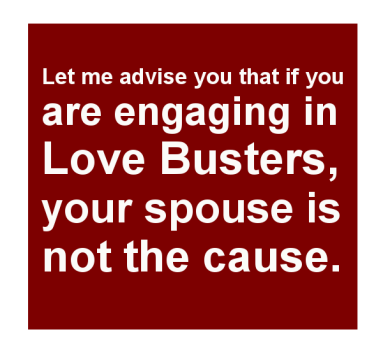 Dr. Harley’s first and best selling book is His Needs, Her Needs. Many couples buy just this book and are able to save their marriage. But in our case, and in the case of many couples that I have seen, His Needs, Her Needs is not enough. Meeting emotional needs is only one half of the equation. Your balance in your spouse’s Love Bank can’t reach the romantic love threshold if you are making withdrawals, and so most marriages need to learn to avoid Love Busters.
Dr. Harley’s first and best selling book is His Needs, Her Needs. Many couples buy just this book and are able to save their marriage. But in our case, and in the case of many couples that I have seen, His Needs, Her Needs is not enough. Meeting emotional needs is only one half of the equation. Your balance in your spouse’s Love Bank can’t reach the romantic love threshold if you are making withdrawals, and so most marriages need to learn to avoid Love Busters.
Many people grew up in households where disrespect and angry outbursts were unacceptable. Their parents didn’t treat each other that way and did not allow the children to treat each other that way. But a lot of us come from families and a culture that believes that everyone has an angry outburst now and then, and that disrespect is sometimes a great way (perhaps even the only way) to get a point across. Without any examples or teaching to the contrary, some of us took our natural instinct to be disrespectful or angry and turned it into a very well-practiced habit.
Likewise, some people have a philosophy that it is okay for a wife to boss a husband around, or a husband to boss a wife around. I can think of many marriages I’ve known where one or the other spouse was the boss, or where both husband and wife constantly competed to be boss (what Dr. Harley calls “dueling dictators”).
So selfish demands, disrespectful judgments, and angry outbursts come very naturally to many people in marriage, and an awful lot of people feel that these behaviors are justified, at least some of the time. It’s a real shock to see someone like Dr. Harley labeling these behaviors as abuse, and many people want to argue with that definition. But these behaviors destroy marriages. They make people as miserable as they can possibly be, from the relationship that should make them happier than any other. How fair is that, to the victim of the demands, disrespect, and anger?
The other Love Busters are also common and tolerated in many families. The idea that a  husband (or a wife) should give up any behaviors that their spouse is not enthusiastic about will usually get you laughed at. Dr. Harley’s Policy of Radical Honesty is only called “radical” because most people don’t believe you should reveal to your spouse everything you know about yourself – most people think there are some things that you should hold back. And if you suggest that husbands and wives should make an effort to eliminate habits that their mate finds annoying, prepare to be told by the “experts” how wrong you are.
husband (or a wife) should give up any behaviors that their spouse is not enthusiastic about will usually get you laughed at. Dr. Harley’s Policy of Radical Honesty is only called “radical” because most people don’t believe you should reveal to your spouse everything you know about yourself – most people think there are some things that you should hold back. And if you suggest that husbands and wives should make an effort to eliminate habits that their mate finds annoying, prepare to be told by the “experts” how wrong you are.
Selfish demands, disrespectful judgments, and angry outbursts all lead to an abusive marriage. And dishonesty, independent behavior, and annoying habits all lead to an incompatible marriage. Most people (and counselors) believe that some or all of these behaviors should be tolerated, at least some of the time. But most people (and counselors) don’t have a good marriage, and don’t know how to teach people how to have a good marriage!
If you want to have a good marriage, the only way I know to do it is to draw a firm line and decide that these behaviors are unacceptable and you are not going to tolerate them. They are called “Love Busters” for a reason – they bust love, like a bubble or balloon shot with a gun.
I have seen a lot of people look at this program and proclaim that the problem is that their spouse will not meet their emotional needs, but do so in a way that demonstrates that they are very disrespectful toward their spouse. Let me advise you that if you are engaging in Love Busters, your spouse is not the cause. Dr. Harley’s position is that you need to refrain from Love Busters even if your spouse doesn’t meet your emotional needs, and even if they engage in Love Busters themselves! Dr. Harley and his wife Joyce frequently comment that “there are reasons for an affair, but no excuses.” Well, there are also reasons for angry outbursts, but there are no excuses. There are reasons for disrespectful judgments, but there are no excuses. There are reasons for independent behavior, but there are no excuses.
The marriages that I have seen recover are the ones where somebody decided that they weren’t going to engage in Love Busters, no matter what their spouse did. If all you want to do is talk about the intolerable situation your spouse is causing and why you are so upset, don’t expect anything to ever get better. Instead of talking about your justifications for your love busters, do something – learn to stop love busting, and if your spouse doesn’t follow suit, look into your additional options like separation or getting professional help. But whatever you do, don’t fall back on Love Busters. Otherwise you are as much to blame for the failure of your marriage as your spouse.


